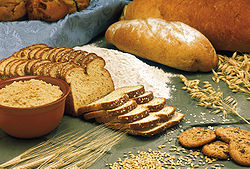User:JediMasterMacaroni/sandbox2
 Grain products | |
| Halakhic texts relating to this article | |
|---|---|
| Mishnah: | Avodah Zarah ch. 2, Mishnah 6 |
| Babylonian Talmud: | Avodah Zarah 35b, 36b |
| Shulchan Aruch: |
|
In Jewish law, pat Yisrael or pas Yisroel (Hebrew: פת ישראל
Halakhic development
[edit]By the time of the rabbis of the Mishnah (Tannaim),[1] Chazal (the Jewish sages) instituted an injunction against bread that was baked by a non-Jew.[2] The Mishnah, recorded in tractate Avodah Zarah, notes, however, that there is no prohibition against deriving benefit from such bread—the issue lies only with eating it.[1]
The later generation of rabbis, the Amoraim of the Babylonian Talmud, added that the reason for the prohibition was to prevent intermarriage between Jews and non-Jews and discussed a possible leniency from Rabbi Yehuda ha-Nasi for a non-Jew whose profession is centered on baking; however, while the Gemera does not accept the leniency,[3] other halakhic opinions still allow for it.[2] Traditional Ashkenazi pronunciation of the Hebrew[4] is "pas Yisroel."[2]
The Mishneh Torah, written by Maimonides (the Rambam), was the first source to codify pat Yisrael. It includes specifications for allowing bread of a "gentile baker" and notes ways for a non-Jew to make the bread with a Jew involved in certain ways with the baking process, which renders the resulting bread not subject to pat akum (bread of a non-Jew).[5] The Shulchan Aruch, Rabbi Joseph Karo's widely accepted code of halakha,[6] also includes the halakha, doing so in its Yoreh De'ah section. Rabbi Karo elaborates on what the injunction means practically, adding that only bread from the Five Grains (halakhically speaking, these include wheat, spelt, rye, barley, and oats) falls under the prohibition. He also repeats the leniency of "commercial bread" that was intended for selling instead of for a personal meal, noting that some places did rely on it. Included in the Shulchan Aruch's discussion of pat are several scenarios where commercial bread is permissible, and it includes the idea of a Jew turning on an oven that a non-Jew then uses to bake bread.[7]
The Shulchan Aruch's Orach Chaim section deals with pat Yisrael in a different way, discussing a requirement to be stringent about pat Yisrael for those are usually not if it is during the Ten Days of Repentance, which lead up to and include Judaism's holiest day of the year, Yom Kippur.[8]
Modern observance
[edit]There are other factors as to whether it would be allowed, including if strict pat Yisrael product is available; if the pat Yisrael bread is of inferior quality; and if it is during the Ten Days of Repentance, Shabbat, or a Yom Tov, all times of increased holiness.[2]
References
[edit]- ^ a b "Avodah Zarah 2". Sefaria. Archived from the original on 2022-06-03. (Mishnah 6)
- ^ a b c d "How Pas Yisroel is Created". Orthodox Union Kosher. August 19, 2009. Archived from the original on August 4, 2022.
{{cite web}}:|archive-date=/|archive-url=timestamp mismatch; August 4, 2021 suggested (help) - ^ "Avodah Zarah 35b". Sefaria. Archived from the original on 2022-06-03.
- ^ "Ashkenazic and Sephardic Hebrew". Archived from the original on 2015-08-16.
- ^ "Mishneh Torah, Forbidden Foods 3". Sefaria. Archived from the original on 2022-10-27.
- ^ "Archives · Shulchan Aruch". Torah.org. Archived from the original on 2016-09-29.
- ^ "Shulchan Aruch, Yoreh De'ah 112". Sefaria. Archived from the original on 2022-09-15.
- ^ "Shulchan Aruch, Orach Chaim 603". Sefaria. Archived from the original on 2022-11-09.
